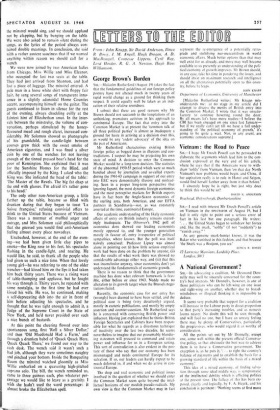George Brown's Burden
.-E=nngt 7C -01
From : John Knapp, Sir David Anderson, Ilinca R Bossy. I. M. Angell, Hugh Brogan, A. D. MacDougall: Contresse Lippens. Cyril Ray, Lord Horder, R. G. A. Newton, Hugh Ross
SIR.—Malcolm Rutherford (August 19) takes the fact that the fundamental guidelines of our foreign policy posture have not altered much in twenty years of rapid world change as a ground for thinking them suspect It could equally well be taken as an indi- cation of their relative soundness.
I submit that these are good reasons why Mr Brown should not succumb to the temptations of an unthinking, premature activism in his approach to continental Europe. The fact that entry into the Common Market is at present the 'common talk of all three political parties' is almost as inadequate a ground for haste in arriving at a decision over this, as would be any 'ardent advocacy' of the idea on the part of Americans.
Mr Rutherford characterises existing British foreign policy as bogged down in illusions and con- tradictions. I suspect he may be projecting his own state of mind. A decision to enter the Common Market would be a long-term decision. The statistics of the abnormal 1950-55 period which were so much bandied about by journalists and so-called experts during the 1961-63 campaign in support of our entry into EEC were demonstrably illusory and mislead- ing. Seen in a proper long-term perspective (but ignoring Japan), the most dynamic foreign economies and the most perceptive markets for British exports have in fact been the Anglo-Saxon economies of the sterling area, both Americas, and our EFTA partners in Scandinavia—not, as was constantly asserted at the time, continental Europe.
Our academic understanding of the likely economic effects of entry on British industry remains exceed- ingly inadequate. The Observer's 1962 poll of economics dons showed our leading economists mostly opposed to, and the younger generation mostly in favour of, entry irrespective of political sympathies, where known. But the poll was itself naively conceived: Professor Lipsey was almost alone in pointing out (i) how little serious empirical work had been done on the problem by anyone, (ii) that the results of what work there was showed no considerable advantage either way, and (iii) that this was inconclusive anyway, since economists don't yet understand the fundamentals of economic growth.
There is no reason to think that the government machine has done what relevant homework is feas- ible, either before or since 1963. Neddy made no alteration to its growth target when the Brussels nego- tiations failed.
Recently, the economic case for our entry has (wrongly) been deemed to have been settled, and the political case is being (very desultorily) argued, mostly in esoteric publications, and mostly by empty assertion and counter-assertion. Mr Rutherford says he is concerned with conserving British power and influence. Having just explained that he thinks British Foreign Secretaries and Cabinets have been respon- sible for what he regards as a disastrous technique of inactivity over the last two decades, he seems nevertheless to imagine that our presumably blunder- ing statesmen will proceed to command and retain power and influence for us in a European setting. This sort of contradiction is also evident in the pos- ture of those who say that our economy has been mismanaged and needs continental Europe for its salvation. If so, our leaders can hardly expect to be much deferred to, if and when we do arrive in con- tinental Europe.
The deep and real economic and political issues involved in the question of whether we should enter the Common Market seem quite beyond the intel- lectual horizons of our modish pseudo-radicals. My own view is that the Common Market may in fact represent the re-emergence of a potentially retro- grade and stultifying neo-mercantilism in world economic affairs. Much better options than that may well exist for us already, and more may well become available to us presently as understanding of the poli- tical economy of growth improves. Mr Brown should, in any case, take his time in pondering the issues, and should insist on maximum research and intelligence on all the alternatives potentially open to this coun- try, before he leaps.
JOHN KNAPP
Department of Economics. University of Manchester [Malcolm Rutherford writes: Mr Knapp mis- understands me : at no stage in my article did I attempt to discuss the merits of British entry into the Common Market. 1 wrote that it was unsatis- factory to continue hovering round the door. By all means let's have more studies—I believe the CBI has been engaged on one since last January— but if we really can't act till we have a full under- standing of 'the political economy of growth,' it's going to be quite a wait. Nor, in any event, are economic considerations supreme.]






























 Previous page
Previous page